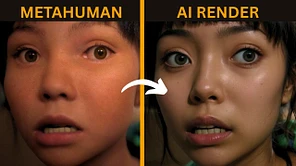Last week we roughed out our short film animation. The only problem? Our characters were totally naked. This week’s mission: use AI to give our main character, Benny, some custom clothes.
The Plan
We laid out a three-step challenge:
-
Generate outfits with AI → Based on the script, Benny needed a white leather jacket, tattered jeans, and red shoes.
-
Turn 2D into 3D → Convert those AI images into 3D models.
-
Fit them to our Metahuman → Use Metatailor to dress Benny inside Unreal.
Step 1: AI Outfit Generation
We asked ChatGPT to create reference photos of each clothing item on a black background. These were then dropped into Hunyan, which turned the flat images into full 3D objects.
The results? Incredible — but dense. The meshes were way too heavy to be useful for animation.
Step 2: Retopology Magic
A quick Google search later, we found Tripo 3D, an AI retopology tool. It simplified our dense meshes into clean, workable geometry in seconds.
After that, we pulled everything into Blender to prep:
-
Deleted interior faces
-
Cleaned up geometry
-
Readied the meshes for animation
Step 3: Dressing the Metahuman
With clean models in hand, we loaded everything into Metatailor. This drag-and-drop tool makes fitting clothes to 3D characters surprisingly painless. In just a few minutes, Benny was fully dressed.
👉 If you’re curious, check out Metatailor — it’s a huge time-saver for creators.
The Results
So, can you use AI to dress your Metahumans? Absolutely.
This workflow is:
✅ Quick
✅ Cost-effective
✅ Achievable for a two-person team
That said, it’s not totally push-button and wham!. You still need to know how to:
-
Clean up meshes
-
Retopo models
-
Prep geometry in Blender
Our next step: testing Chaos Cloth so the clothes move realistically instead of looking rigid.
Why This Matters
For small indie teams, AI tools like Hunyan, Tripo 3D, and Metatailor are game-changers. They speed up what used to take weeks of manual work into a workflow you can pull off in just a few days.
We’re excited to keep refining this process and sharing how these tools can accelerate filmmaking for creators like us.











